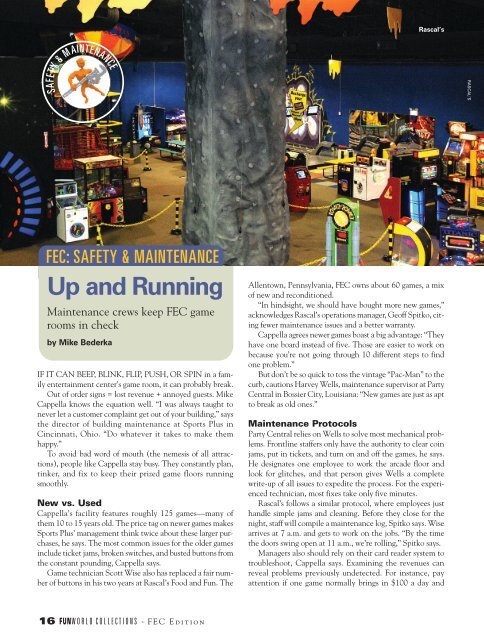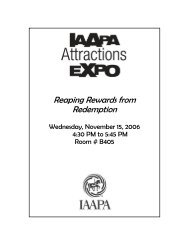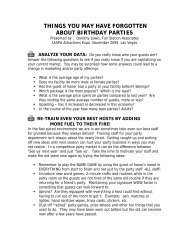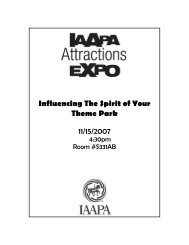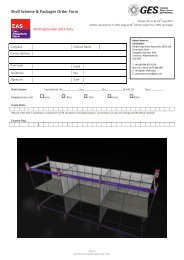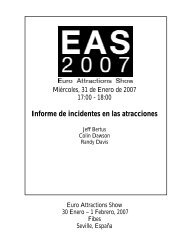Family Entertainment Centers - IAAPA
Family Entertainment Centers - IAAPA
Family Entertainment Centers - IAAPA
You also want an ePaper? Increase the reach of your titles
YUMPU automatically turns print PDFs into web optimized ePapers that Google loves.
SAFETY & MAINTENANCE<br />
FEC: SAFETY & MAINTENANCE<br />
Up and Running<br />
Maintenance crews keep FEC game<br />
rooms in check<br />
by Mike Bederka<br />
IF IT CAN BEEP, BLINK, FLIP, PUSH, OR SPIN in a family<br />
entertainment center’s game room, it can probably break.<br />
Out of order signs = lost revenue + annoyed guests. Mike<br />
Cappella knows the equation well. “I was always taught to<br />
never let a customer complaint get out of your building,” says<br />
the director of building maintenance at Sports Plus in<br />
Cincinnati, Ohio. “Do whatever it takes to make them<br />
happy.”<br />
To avoid bad word of mouth (the nemesis of all attractions),<br />
people like Cappella stay busy. They constantly plan,<br />
tinker, and fix to keep their prized game floors running<br />
smoothly.<br />
New vs. Used<br />
Cappella’s facility features roughly 125 games—many of<br />
them 10 to 15 years old. The price tag on newer games makes<br />
Sports Plus’ management think twice about these larger purchases,<br />
he says. The most common issues for the older games<br />
include ticket jams, broken switches, and busted buttons from<br />
the constant pounding, Cappella says.<br />
Game technician Scott Wise also has replaced a fair number<br />
of buttons in his two years at Rascal’s Food and Fun. The<br />
16 F U NW O R L D C O L L E C T I O N S n F E C E d i t i o n<br />
Rascal’s<br />
Allentown, Pennsylvania, FEC owns about 60 games, a mix<br />
of new and reconditioned.<br />
“In hindsight, we should have bought more new games,”<br />
acknowledges Rascal’s operations manager, Geoff Spitko, citing<br />
fewer maintenance issues and a better warranty.<br />
Cappella agrees newer games boast a big advantage: “They<br />
have one board instead of five. Those are easier to work on<br />
because you’re not going through 10 different steps to find<br />
one problem.”<br />
But don’t be so quick to toss the vintage “Pac-Man” to the<br />
curb, cautions Harvey Wells, maintenance supervisor at Party<br />
Central in Bossier City, Louisiana: “New games are just as apt<br />
to break as old ones.”<br />
Maintenance Protocols<br />
Party Central relies on Wells to solve most mechanical problems.<br />
Frontline staffers only have the authority to clear coin<br />
jams, put in tickets, and turn on and off the games, he says.<br />
He designates one employee to work the arcade floor and<br />
look for glitches, and that person gives Wells a complete<br />
write-up of all issues to expedite the process. For the experienced<br />
technician, most fixes take only five minutes.<br />
Rascal’s follows a similar protocol, where employees just<br />
handle simple jams and cleaning. Before they close for the<br />
night, staff will compile a maintenance log, Spitko says. Wise<br />
arrives at 7 a.m. and gets to work on the jobs. “By the time<br />
the doors swing open at 11 a.m., we’re rolling,” Spitko says.<br />
Managers also should rely on their card reader system to<br />
troubleshoot, Cappella says. Examining the revenues can<br />
reveal problems previously undetected. For instance, pay<br />
attention if one game normally brings in $100 a day and<br />
RASCAL’S


